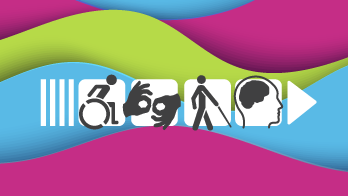By Mangla Shandal and Glen Hayes
We are excited to talk about some work we’ve been tackling to make the workplace more accessible for persons with disabilities, especially when it comes to workplace accommodations.
Imagine that you encounter barriers in the workplace that affect your ability to do your job safely and effectively. Maybe you need a screen reader or adjustments to your physical workspace, or you are significantly affected by environmental conditions in the workplace, such as scents or allergens, lighting deficiencies, or audio or visual distractions. You have found a workplace that is healthy and supportive, and your approved accommodations are in place and working well. But now it’s time to move on to a new job, possibly in another department, and now you’re faced with renegotiating your accommodation requirements with a new manager.
Well, we are proud to introduce the GC Workplace Accessibility Passport. The passport streamlines the accommodation process for employees and managers. It records the agreement between an employee and their manager about the measures or tools to be provided so the employee can work safely and effectively in their job.
The passport is intended to follow employees for the duration of their public service career, eliminating the need for them to renegotiate workplace accommodations when they change jobs. It will reduce delays, remove confusion and facilitate mobility of federal employees with disabilities. The passport is being piloted by several departments, and feedback from the pilot will help shape what is implemented across the GC.
In order to make the workplace accommodation process easier to navigate, we also need to better understand the barriers that exist today, and we need to find ways to implement accommodations more quickly and efficiently. The Benchmarking Study of Workplace Accommodations in the Federal Public Service, completed in 2019, documented the recent experiences of employees and managers using the existing workplace accommodation process with the goal of identifying issues, barriers and opportunities for improvement.
The benchmarking study consisted of two government-wide online surveys with federal public servants who requested an accommodation for themselves or for one of their employees in the past three years. In total, over 6,200 surveys were completed by public servants across Canada, including over 4,200 employee surveys and over 2,000 supervisor surveys.
Results revealed that the accommodation process is complex and time-consuming. Often, line managers say they lack the guidance or resources they need to navigate the process effectively, and both employees and managers highlighted the need for access to neutral, expert advisors in the area of accommodation management. Respondents also identified procurement as a pain-point, along with evidence requirements that are burdensome, complicated and often result in lengthy delays. Four in ten employees reported taking extended sick leave at some point in their career as a result of not being properly accommodated, and many reported their intention to leave their current job, or leave the public service, because of ineffective accommodation. Many employees with invisible disabilities, such as mental health, cognitive disabilities or environmental sensitivities, also reported more negative career outcomes as a result of disability or accommodation-related factors.
Key findings from the study will help us identify opportunities to improve accommodation practices and remove barriers to accessibility and inclusion, such as simplified processes, new tools and resources, and alternative approaches. And, as its name suggests, the benchmarking study will also serve as a baseline against which progress can be measured over time.
The full reports from both surveys conducted under the benchmarking study are available now, along with a recently completed study to validate the key findings which was published on December 3; you can find these on the Benchmarking Study homepage under Canada.ca/AccessibleGC.
The GC Workplace Accessibility Passport and the benchmarking study are funded under the $10 million Centralized Enabling Workplace Fund (CEWF), which will operate through March 2024. Stay tuned for more exciting projects being funded under the CEWF. You can also stay informed on all the latest news on accessibility by visiting Canada.ca/AccessibleGC.




Add new comment